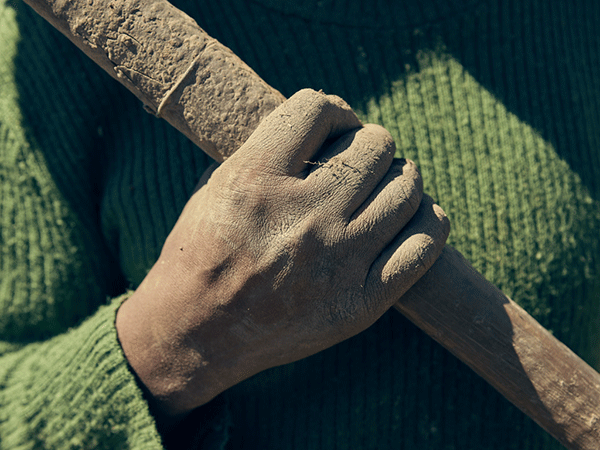The Oxford Real Farming Conference this year went global, and one of the strongest threads running through the event was hearing the voices of those underrepresented in the dialogue around our collective food futures.
We are so locked into the current farming model that there is usually little acknowledgement that how we farm today has just been the blink of an eye in terms of agricultural history. Our reliance on pesticides, intensive farming and the rapid eradication of small-scale farmers has destroyed many localised food systems. To become dependent on a small number of crops, grown in vast monocultures, also makes us much more vulnerable in the climate crisis.
Biodiversity could be our only safety net, the conference heard, something indigenous peoples globally have known for thousands of years. Their careful stewardship of the land means that instead of reliance on a single crop variety, they have worked to increase biodiversity.
Scholar and activist Lyla June described this as a radically different approach that “creates food for all life”. Abundant polycultural habitats are tended in a way that welcomes species in, she said, asking listeners: “What does it look like to not only feed humans, but to nourish the entire ecosystem in a way that invites it to thrive?”
Indigenous food systems differ in that they “do not break what the creator has made”, said June, they build living soil systems, expand habitats, design land practices in an eco-centric way, are leave more than they take, receiving from the land rather than depleting it.
As regenerative farmer Rebecca Hosking said in a session on ‘Sharing the land with all life’: “The term wilderness is a complete western construction…we need to explore in depth our separation story from nature over 2000 years and create a healthier narrative in our relationship; sharing the land with all life and challenge the dominant Eurocentric narrative around indigenous peoples that enables land theft and the destruction of cultures worldwide.”
Indigenous peoples are five per cent of the earth’s population on 20 per cent of its surface, but oversee 80 per cent of our planet’s biodiversity, June told over 5,000 listeners from across the world. Carefully tended over millennia on a huge, whole landscape scale, indigenous lands in places such as the Amazon could be considered the world’s largest forest garden.

Andoni Garcia from global food and social justice movement, La Via Campesina, spoke of the growing awareness of the damage wreaked by industrial livestock farming and the destruction of the Amazon, fuelled by Europe’s heavy reliance on GM soy used in animal feed. He proposed that small-scale peasant farming and agroecology, along with food sovereignty (a term coined to describe a food system built on solidarity, not competition), can oppose and ultimately replace this.
June and Garcia were both clear that animals are a crucial part of natural systems and vital to peasant and indigenous farming systems worldwide.
Rather than it becoming a western-focused polarised meat-versus-vegan debate, Garcia passionately believes it is the disconnect between our relationship with animals that is the root cause: “There is no possible agroecology without livestock, the animals are part of the cycle. It is a difficult debate in which small livestock farmers feel targeted, pointed at as the enemy.
“We are not the real enemy; the real enemy is intensive industrial animal farming. The key of where we need to focus is industrial farming and the overall impact on both climate change and food systems.”
According to both June and Garcia, indigenous peoples and peasant farmers are the casualties of an increasingly globalised commodities market, with both groups seen as unprofitable, backward, and primitive. But rather than standing in the way of ‘progress’, these ancient systems actually hold immense knowledge, contributing so much more than we currently measure as being of value.
Talking about how citizens can help, Garcia suggested supporting agricultural policies that favour food sovereignty and agroecology, working together at a local level to create a more direct and sustainable food system, and joining the fight for both peasant land rights and healthy food for the world’s population.
“Feeding the land is rewarding. We use practices which respect our animals, plants, and soil,” he said. “Our message is inclusive. We want to show that [small-scale farming] is a real alternative to tackle climate change. We need to communicate to our colleagues working in the traditional economic model that there is an alternative, there is a different way of doing things.”
It’s clear that it’s time to shift sustainability to the heart of what we eat. By listening to the quieter voices in land management or farming, we can widen our gaze, and with their help, leave a different legacy, one where we changed course and chose to ‘create a home for all life’.









Thank you for a vitally important article. Three inspiring books which I am reading (simulatenously !!!) around this topic – Sitopia – Carolyn Steel, A small farm future – Chris Smaje and The Spell of the Sensuous – David Abram (a fascinating study of how we have disconnected from the rest of the natural world). I recommend all 3.
Thanks for those great recommendations Ewa. Chris Smaje spoke at the Oxford Real Farming Conference Global this year, really good stuff and such an inspiring event.
Thanks for the book recommendations. Add to that Ecology of Care by DIdi Pershouse, also a presenter at ORFC
Definitely! Her talk at ORFC was amazing.
Thanks for the article and the book recommendations . If you haven’t already seen it I thoroughly recommend a documentary on Netflix called Kiss The Ground, which deals with biodiversity and monoculture versus polyculture etc.